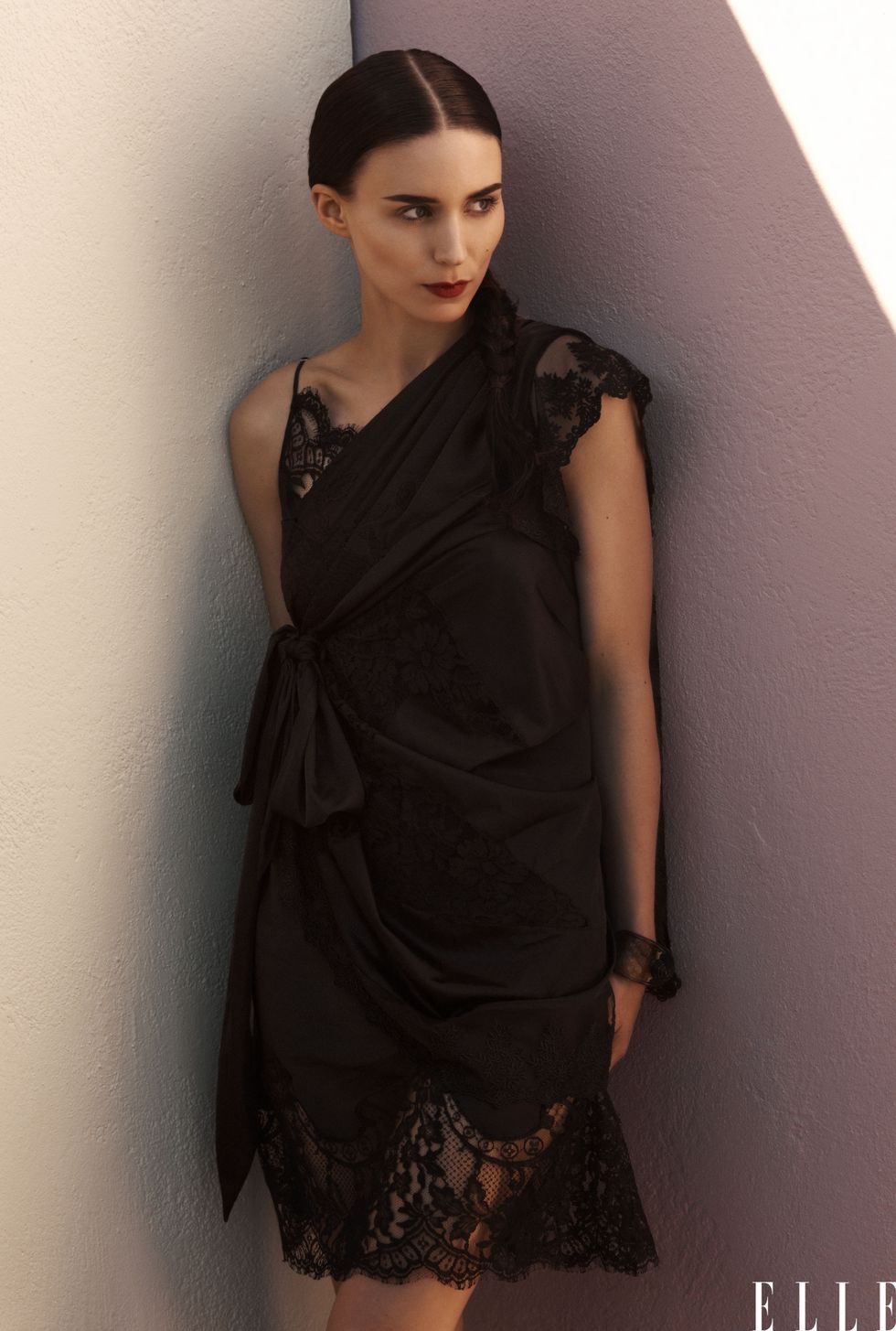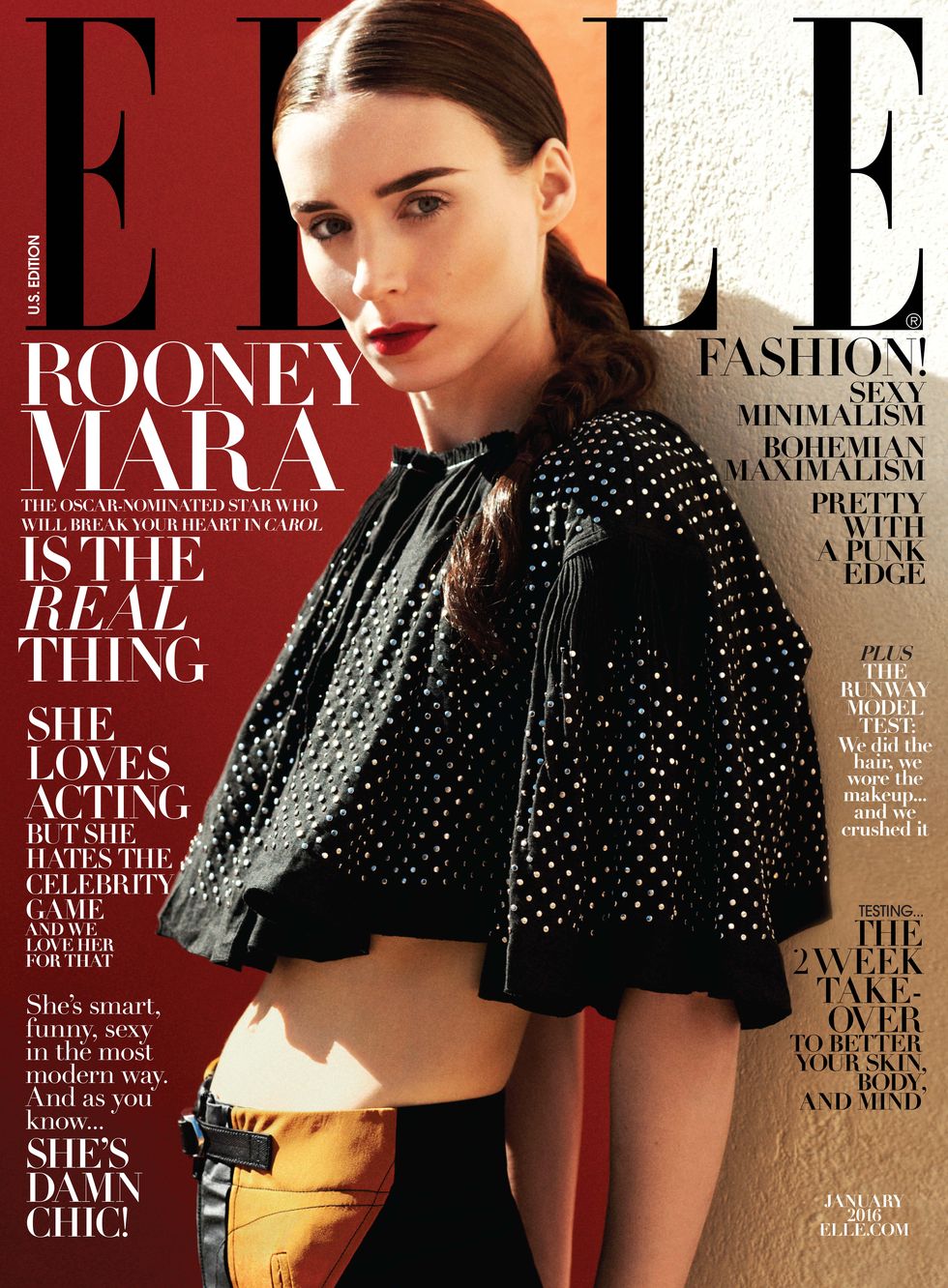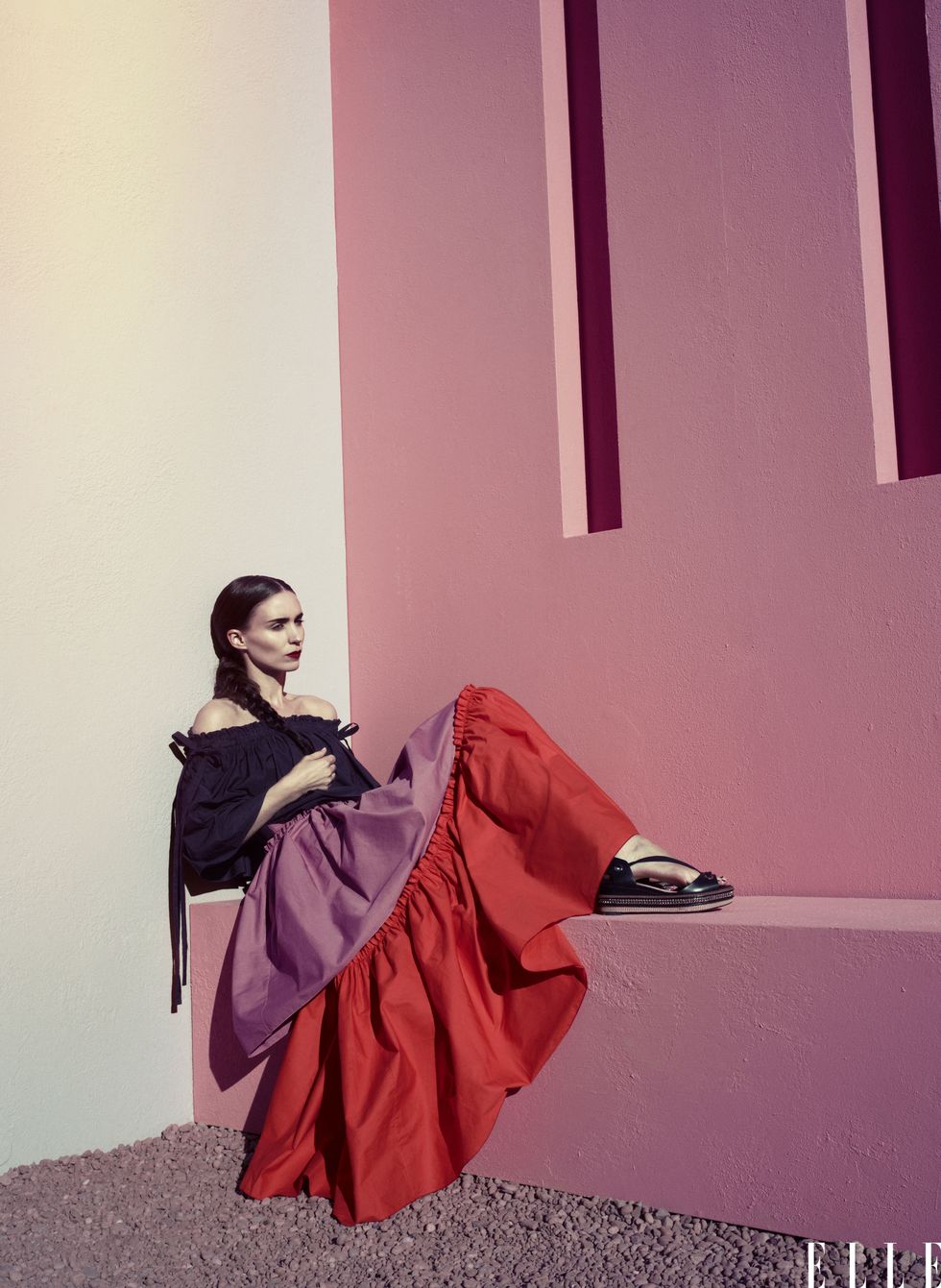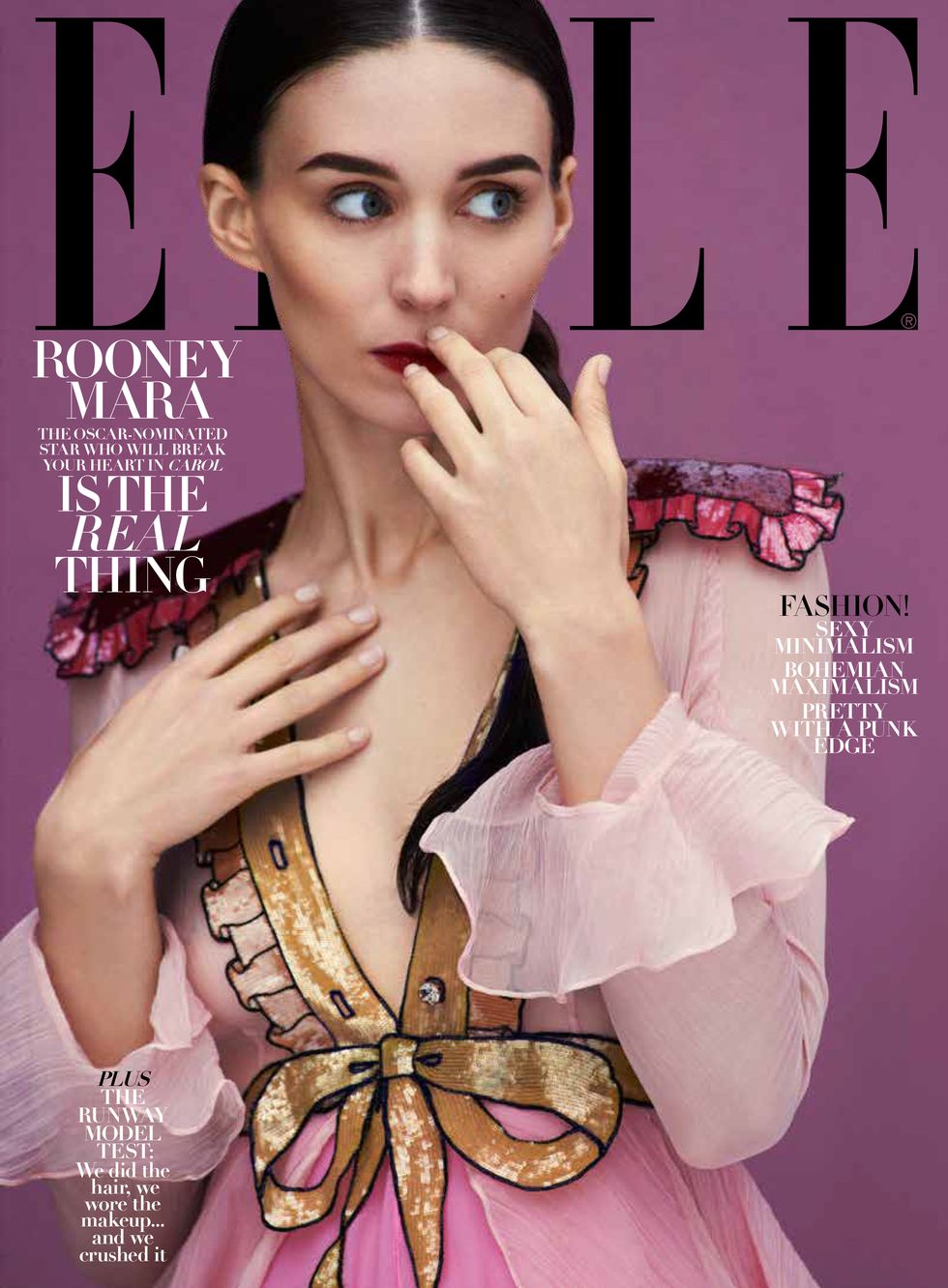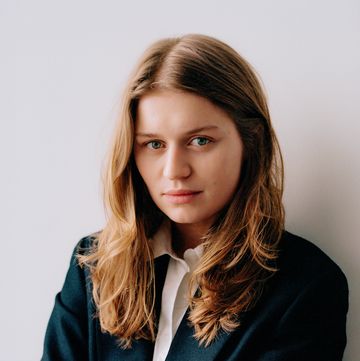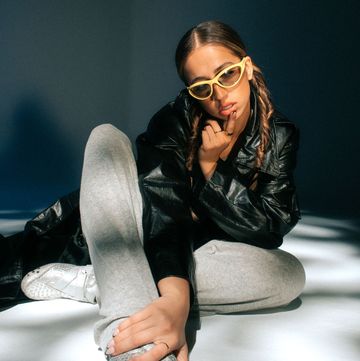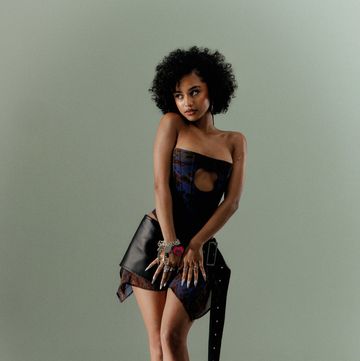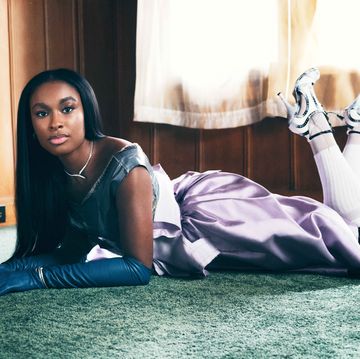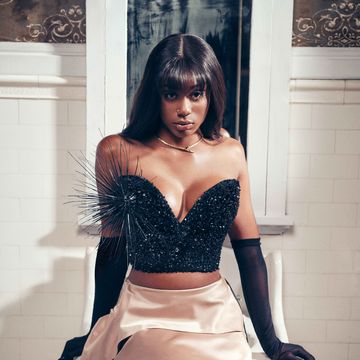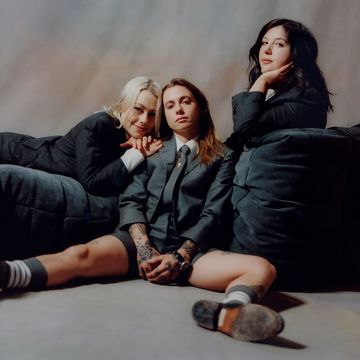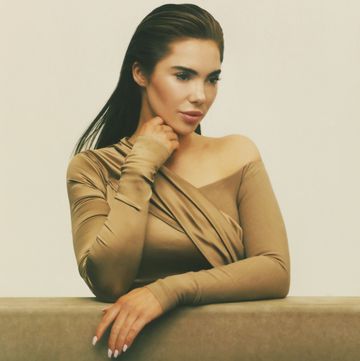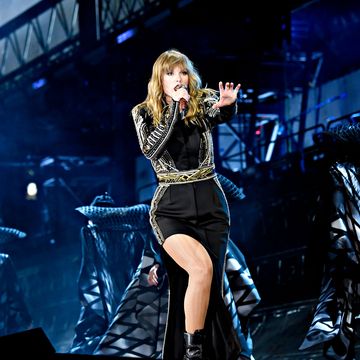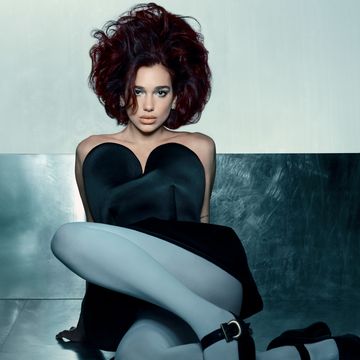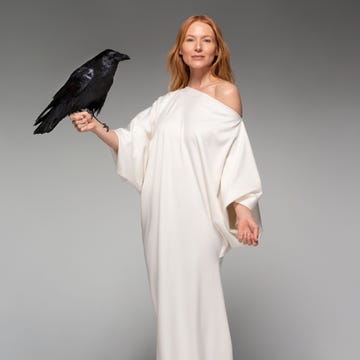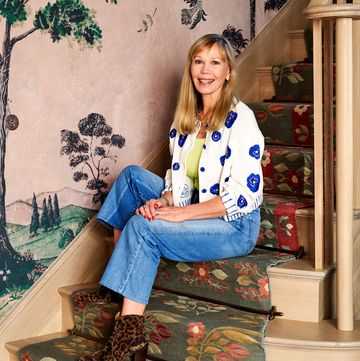Search online, and it's easy to find footage of Rooney Mara being interviewed, in what appears to be a hotel conference room, on the morning she received her first Oscar nomination. She looks happy enough—her dimples, so rarely seen on camera, are very much in evidence—but when she's asked how she found out about the nod for her performance in 2011's The Girl With the Dragon Tattoo, she lies, again and again. "My phone started ringing off the hook, and my mom came running up," she says, in one typical clip. "It was really exciting."
Nearly four years later, over lunch at a "Greenmarket-driven" restaurant in Chelsea (my choice; she'd suggested vegan frozen yogurt), Mara comes clean. "I knew that everyone was going to ask how I'd found out," she explains, "and I didn't really want to share that. You know how, when you have a funny story or a story that means something to you, and you tell people and they don't get it, it kind of cheapens the experience? I didn't want that to happen, so I just made something up. But then I had to answer the question, like, 50 times. Why do I have to give that to people? Why can't I keep it for myself?"
The truth, she admits, "wasn't that different," even if her mother was not, in fact, at her house. (And she still doesn't want to say who was there, although her then-newish boyfriend, writer/director Charlie McDowell, is a likely suspect.) But to Mara, that's not the point. No, the point is that she sometimes wishes she could be permitted to do her job—you know, acting—without also being pressured to surrender what feels like increasingly larger parts of her soul to the link-clicking, comment-leaving, ticket-buying public. "As an actor, you can't just be in the film," she says. "You're also in charge of selling it, and so you have to sell yourself, and you have to be very political and make sure to not say the wrong things. It's exhausting. A lot of pressure is put on the people who were hired to make—not even to make, to be a part of making—the thing."
That she says all this in the midst of yet another interview could sound off-putting, but it's not. Instead, it seems like a genuine reflection of what's going on in Mara's head as she embarks upon a months-long promotional push for Carol, the first of her films since Dragon Tattoo to generate serious awards buzz. "I haven't done it in a while," she says, meaning publicity, "and it's not like riding a bike. You don't just get back up."
Still, she's clearly trying. We'd first met at the Rubin Museum, a sleepy five-story space dedicated primarily to Himalayan art, and she began to elucidate the origin of her interest in the region almost as soon as we paid for our tickets. (The twenty-something clerk who'd charged us had felt it necessary to first confirm that we were both adults, as opposed to students; at 30, the petite, porcelain-skinned Mara could easily be mistaken for a coed.) From there, the conversation moved rapidly to her study-abroad tour of South America, which she loved, to college in general, which she did not, even after she transferred from George Washington University to NYU—not what I'd expected from someone so often described as reserved.
Though chatty, Mara did seem nervous, which made me nervous; her volubility, in those first few moments, felt a little off-kilter. But when she says something later, after we've both calmed down, about learning "to give the other person what they need" in this kind of conversation, it all makes sense. Cate Blanchett, who plays Mara's titular lover in the 1950s-set Carol, describes her as "really available and very generous," but also notes, "She's profoundly self-contained, which I think can feel sort of daunting. She's the least needy person I've ever met."
Mara was raised in tony Bedford, New York, and is a great-granddaughter of the founder of the Pittsburgh Steelers on one side, and the founder of the New York Giants on the other; the former team is still mostly owned by a great-uncle and a cousin, while her father and his 10 siblings share a 50 percent stake in the latter. But she insists that her upbringing, while "privileged," was relatively ordinary. "People think that I grew up going to Barneys for my back-to-school clothes," she says. "I went to the Gap. We lived in a nice house on a cul-de-sac, but it wasn't a mansion. We didn't have a butler or a maid."
Growing up in a football family (or, more precisely, two) was, she says, "like growing up in any family." She's not a huge fan of the game: "I'm so not keyed into it," she says, although she does find it "meaningful" when the teams are doing well—particularly the Giants, for whom her father works as senior vice president of player evaluation (her mother was a real estate agent)—"because it means so much to the whole family." And she's really not a big fan of talking about it. In middle school, when certain classmates began to say that "there was something weird or special" about her background, "it didn't feel good," she says. "And that's carried on into my adult life. It's followed me here." When I remind her that David Fincher, her Dragon Tattoo director and now close friend, had called her a "trust-fund baby" in an early interview, she says, "He was being ironic. After that article came out, I was like, 'Fuck you, David. I wish I had my goddamned trust fund.'"
Mara has two brothers—one older, one younger—as well as a sister who began working as an actor in her early teens; now 32, Kate Mara is well known for her roles in House of Cards and in movies like The Martian. But Rooney, who describes herself as having been "a dark, brooding, miserable little adolescent," held back. "I didn't want to do what she was doing," she says. "We're close now, but we weren't then. And I don't think I would have been capable of it. Not acting, but handling all of the shit that comes with it. She was much more together than I was." Rooney didn't even attempt to take part in a high school play until after Kate had graduated. "I never wanted to participate, because she was my older sister, and she was really good." Of course, when Rooney finally auditioned, for Romeo and Juliet, she was no slouch either. "I just read a monologue and left," she recalls, "and my English teacher came running down the hall after me. He was like, 'I didn't even know you could talk! What was that?'"
"I don't think I probably was any good," she continues, brushing aside the fact that she was promptly cast as Juliet. But "I've always been a very sensitive person, and people tell me that if I'm in a certain mood and I go into a room, my mood will permeate the room. It's not on purpose—I'd rather be invisible in those moments—but I'm really bad at faking how I feel. Like, my emotions kind of live all over my body at all times, and there's not a good way for me to hide it." Even now that her talents have matured, she says that these sometimes-inconvenient inborn traits still play into her process. "Because I'm highly empathetic, it's easy for me to put myself in the character's shoes. It's, you know, finding the truth of the moment."
Ah, yes. The truth. This might be a good moment to note that Mara's (let's face it: very white) lie on the morning she was nominated for an Oscar appears to have been an aberration—she's actually somewhat obsessed with honesty, devoting much thought to the issue of how much of her real self she can share without, as she puts it, "getting into trouble."
"People don't really want me to be honest," she insists. "People want me—people want girls—to be grateful, gracious, poised. Not real. I watch interviews from the 1970s, of Patti Smith or John Cassavetes, and everyone's smoking, drinking, totally misbehaving, but they're being completely authentic, and I'm so jealous because that would never happen today. There's always a pre-interview, so you know what jokes you have to hit, and there's nothing genuine about it. And I hate that. I hate being a phony. I hate having to censor myself."
I'd be perfectly fine with it, I assure her, if she wanted to be 100 percent real. "But I can't," she says. "Like, not that I tweet, but if you tweet the wrong thing, you have, like, four different organizations on your ass, asking for an apology. Artists are deeply sensitive, vulnerable people, and when you are supercandid and then you get ripped apart for it, you're not going to want to do it again." So she censors herself, frequently going off the record during our conversation. These not-for-publication asides are pretty innocuous—such as her feelings about marriage. "Just because," she explains of that subject, back on the record, "until a girl reaches a certain age, that's all anyone cares about."
There's another category of questions she won't answer at all, about the kind of music she listens to, for example, or her favorite movie, or the director she'd most like to work with. "People want to know those things because they're trying to place you," she says. "It's like, 'What did she order for lunch?'" (That one I know, but I'm not telling. I feel a little bad, even, about the vegan fro-yo thing, but it is germane.) "When literally most of your life is people trying to corral you or understand you or pin you down, you get kind of protective." As Blanchett says, "She really puts paid to the idea that all actors are exhibitionists."
Of course, there is one way in which Mara expresses her taste: her much-lauded sense of style. During the rollout of Dragon Tattoo, she became a fashion-world darling, beloved for her sparrowy frame and her severely chic red-carpet gowns, which tended to be either black, white, or both, and frequently involved sheer panels and cutouts. Givenchy designer Riccardo Tisci, who dressed her often during that period and now regards her as a friend, says he "grew obsessed with her. I saw pictures of her, this gothic beauty, the porcelain skin, the black hair, the red lips, and thought, She is my woman. She was exactly the woman I imagined when designing clothes."
"I think it was the haircut," Mara says modestly, meaning the dark, baby-banged semimullet she'd gotten to play Lisbeth Salander. But then again, she admits, the role changed her, and the hacker-punk makeover was a big part of that. Prior to booking the part, she'd dressed, like many young women, to please others—in old pictures of her, there's a preponderance of frills. "When you're starting out as an actress, you have to go to auditions, and you have to have all these outfits, like 'the slutty girl.' Even in my family, I'd have to dress a certain way for my grandparents." But that option "went out the window" while she was shooting the film. "There was no more trying, and I felt really unapologetic and comfortable. In a lot of ways, I felt more like myself than I ever had." (Truly: Asked whether Sony's failure to green-light the Dragon Tattoo sequel—once seen as a sure thing—had a silver lining, in that it allowed her to leave Lisbeth's distinctive look behind, she says no. "I miss that haircut," she insists, adding that she'd happily film a follow-up anytime, if she's not already "too old.")
Even still, she's long since dyed her hair back to its natural medium brown, and she promises that her everyday wardrobe is nowhere near as carefully considered as the clothes she chooses for premieres and other events. "I love looking at fashion—it's a form of art, completely. And I'm very interested in aesthetics. But in my life, in L.A., I'm usually in workout clothes or pajamas, because I hate getting dressed in the morning."
Carol, now in theaters, is based on a 1952 romance novel called The Price of Salt, by Patricia Highsmith; Mara plays Therese, a mousy, slightly odd shopgirl who falls in love with Blanchett's married sophisticate. She's wonderfully cast, as the film's director, Todd Haynes, points out. "Oh my God, I made such the perfect choice, if I do say so myself," he gloats as soon as he picks up the telephone. Indeed: A different director who was previously attached to the project had also approached Mara about the role, she says, but she'd just finished shooting four movies in a row—2013's Her (as the lovelorn lead's ex-wife); Side Effects (as a—spoiler alert—dangerous wife masquerading as a sleepwalking depressive); and the Terrence Malick–esque small-town crime drama Ain't Them Bodies Saints—as well as an as-yet-unreleased project written and directed by the actual Terrence Malick. So she said no. "Which is crazy to me now," she says, "because who would ever pass up the chance to work with Cate? I must have really hated myself during that time."
Well, she was tired, certainly. "Exhausted," she confirms. She'd moved to L.A. and started working shortly after college graduation, appearing as a high school basketball player in 2009's The Winning Season and starring in a 2010 remake of A Nightmare on Elm Street. But it was her much-smaller part in that year's The Social Network that really set her career in motion: Although the (apocryphal) college girl who dumped Mark Zuckerberg and prompted him to create Facebook has almost nothing in common with Dragon Tattoo's asocial rebel, Fincher—who directed both movies—nevertheless thought of Mara when he was seeking a female lead for the 2011 film. Her subsequent performance, which was simultaneously spiky, tough, and achingly vulnerable, combined with the aforementioned physical transformation, rightly made her a star, but the ensuing whirlwind wore her out. Most young actors in their first flush of fame would be too scared of losing everything to walk away from a hot streak, but that's exactly what Mara decided to do, taking a year off to travel, mostly, but also to spend a summer living in a rental in Brooklyn. As she sees it, there was no other option. "I just didn't have anything left to give."
Her reentry has been a bit rocky. Trash, a favela-set thriller in which she played an aid worker, was barely released in the U.S., while the would-be blockbuster Pan bombed. She says she chose the Peter Pan prequel, in part, because her agents "felt that I should maybe do a movie that people would actually see." But even if it had done well, she might have regretted it; asked about the backlash that ensued when it was announced that Mara was playing the originally Native American Tiger Lily, she says, "In hindsight, I wish I hadn't put myself in that position."
But Carol is something better than a return to form: It reestablishes her as a major talent, and with a role that's completely different from the one that made her a star. "She has so much integrity," Haynes says, "and such a surprising sense of understatement. She really understands the medium of film and its ability to convey emotional changes with very small, almost invisible gestures. She knows her own strength." Thanks to her subtle, affecting showing (in what is, it should be noted, a subtle, affecting film), Mara's a shoo-in for another Academy Award nomination—she's already won the Best Actress prize at Cannes—especially because the studio has opted to put her forward in the Supporting class, leaving Best Actress clear for Blanchett. (It's a move that some pundits are calling "category fraud.") [Editor's Note: Mara was, in fact, nominated in the Best Actress category.]
"It's such a weird process," Mara says of the campaign. "The whole thing feels kind of gross to me. If [Cate and I] were male and female, there probably would be no question." She's unsure whether she's allowed to say any more, but it's not hard to imagine how someone so scrupulous might feel about being accused, however indirectly, of cheating. "Getting nominated means something," she says finally. "You will get better parts, and I really do want people to see the film. But I don't feel like it's something I'm desperate for. I would forgo it all to keep my integrity."
This heartfelt statement reminds me of something she'd said earlier, while discussing the start of her career. "I'm not someone who's like, 'If I can't act, I don't know what I'll do.' If I had to act in things that I didn't believe in, or that didn't fulfill me, I'd rather do something else." It's a rare point of view for someone working at her level, but when I suggest that her personality type seems rather at odds with her chosen profession, she agrees: "It's totally the worst—it was the worst life decision ever." She's joking, I'm sure, though it's impossible to tell to what degree.
"There are certain times when I love [acting] so much," she continues, now serious, "and I feel so fulfilled by it. But it doesn't fulfill me most of the time. Like, I feel like an artist without an art form." Will she find something else, then? "I hope so. If I did, though, it wouldn't be for the world. It would be just for me."
Hair by Ward at the Wall Group for Living Proof; makeup by Kate Lee at Starworks Artists for Chanel Beauté; manicure by Geraldine Holford at the Wall Group for Dior Vernis; set design by Colin Donahue for Owl and the Elephant; production by County Fair Productions; fashion assistants: Daniel Gaines, Salima Breie-Jobarteh, and Tas Tobey
This article originally appeared in the January 2015 issue of ELLE.
